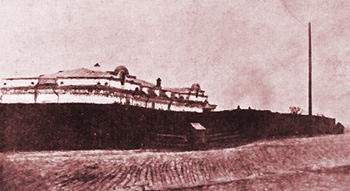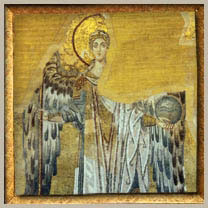A comparison showing how GEDmatch and ancestry.com display there information in different ways and how they interprete your DNA results.
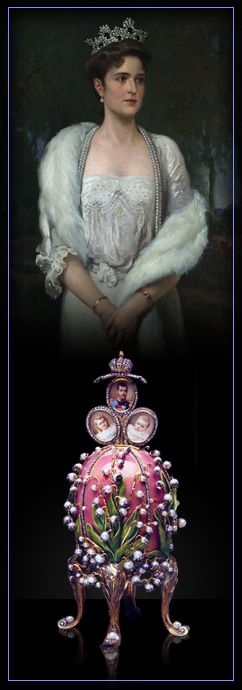

 Chapter XXXIEkaterinburg, April to July 1918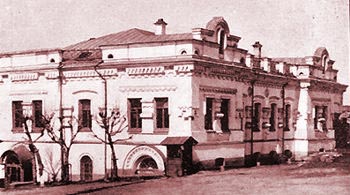 Above: The House of Ipatiev. The house at Ekaterinburg was much smaller than that in Tobolsk. It had belonged to a well-to-do engineer named Ipatiev, and had been requisitioned by the Soviet. Two days before the Imperial Family arrived, I was told it had been hastily got more or less into order, and a high wooden paling was put up all round it, so that only the upper panes of the windows could be seen from the street. The party had the use of three rooms : a bedroom, which was occupied by the Emperor, Empress and their daughter; a sitting-room, where Dr. Botkin and the men-servants slept at night; and a room, meant for the Emperor's dressing-room, in which the maid, Anna Demidova, slept on a camp-bed. The remainder of the house was occupied by the Kommissars and the guard. The furniture had belonged to the former owners. The Imperial Family could not realise at all where they were staying, as nothing could be seen from the windows except the gilt cross on top of the belfry of a church in the square opposite. There was a small garden belonging to the house, which, later, they were allowed to use at stated hours. They could not go freely in and out as they had done at Tobolsk. All the things they had brought with them were thoroughly searched. The men even wrenched the Empress's grey suede hand-bag rudely out of her hands, though she had only her heart-drops, pocket handkerchief and smelling- salts inside it. This was the only time that the Emperor showed acute irritation. The rudeness to his wife thoroughly roused him, and he said sharply to the Kommissar, that, up till now, they had at least been treated with common civility. The man retorted rudely that thy were the masters now and could do as they pleased, and was so aggressive that the Empress had to pacify the Emperor for fear of causing trouble. From that time the valet Chemodourov told me the Kommissars were always rude to them. Their Majesties' dinner was brought in to them from a Soviet restaurant. It was coarse food, and the Empress could scarcely touch it. It was brought at most irregular hours, when it occurred to the guard, and was sometimes delayed till three or four PM. They often had no tea for breakfast, as the soldiers used up all the hot water. Supper consisted of the remains of the midday meal, warmed up by the maid. The servants had to sit at table with the Imperial Family, by order of the Kommissar. At first they refused to do this, out of respect for their masters, and agreed only at the Emperor's express command. There were neither tablecloths nor napkins, and only five forks for seven people. Dr. Botkin pleaded unsuccessfully for better food and for some comforts for the Empress, but his appeals were unheeded. Not only did the Kommissar and the guard help themselves to the dishes before they ever reached the Imperial table, but often one of them would come in during the meal and, pushing aside the Emperor, would pick some piece he fancied out of the dish with his fork, saying that by now they had had enough! The Imperial Family had to be up and dressed by 8:15 A.M., when the new Kommissar came to "inspect." He was a drunken workman called Avdeev, from one of the factories near the town. He was rude and totally wanting in any consideration. The eight riflemen who had come with Iakovlev's men from Tobolsk were imprisoned for several days in the basement of the Ipatiev house, and then sent back with their officer Matveev to Tobolsk. The men now on guard were men from the Syssert and Zlokazov factories. The men forming the outer guard were often changed. The inner guard had been specially chosen from among the most militant Bolsheviks, and they spared the Emperor and Empress no vexation or unpleasantness. The doors between the rooms had been taken off their hinges, so that they might see all the rooms at one glance when they came in. They would appear at any moment, without warning. A sentry was posted at the door of the lavatory and followed the Empress and her daughter at every step. Their remarks were rude and disgusting, and Dr. Botkin's complaints to the Kommissar were ignored.The little money they had brought with them was taken away, so that they could not get anything they needed. The only red-letter days for the Empress were the rare ones on which she got a small note from her children at Tobolsk. Holy Week came, but no church was allowed. They asked to be given fasting food, but could only get a little gruel for the Empress. On Maundy Thursday they put all their ikons on a table in the sitting-room, and at vesper-time the Emperor and Dr. Botkin read the Gospel for the day. Even now the Empress does not seem quite to have abandoned hope that, when the children joined them, they would be moved somewhere else and that things would improve. The children, meanwhile, were leading a desperately anxious life at Tobolsk. Stories of the Emperor's treatment were repeated to them by the returned soldiers, and the future looked very black. Alexei Nicholaevich's improvement was slow. His temperature was still high, and he was extremely weak from loss of blood and unable even to sit up in bed. Colonel Kobylinsky and his men were replaced on May 14th by a mixed guard of Letts and sailors. The new-comers were a great deal more severe than their predecessors, who had been openly sympathetic to the children since their parents left. The stoker Khokhriakov was nominally the chief, but it was evident that Rodionov, who had replaced Kobylinsky, was the head man. He knew no pity, but, on the contrary, seemed to take pleasure in tormenting and humiliating those under his rule. He started the system of a daily roll-call. The Grand Duchesses had to assemble in the sitting-room and to reply to his question, "Are you Olga Nicholaevna? Tatiana Nicholaevna, etc.? " while he added, contemptuously, that there were so many of them he could not remember either their names or their faces! Sentries were posted inside the house. All the doors had to be open. The servants were not allowed out. Nagorny once took a bunch of radishes with three lines written by the Tsarevich to the doctor's son. The man was searched, and it was with the greatest difficulty that General Tatistchev managed to persuade Rodionov not to court-martial poor Nagorny. At Easter a priest and four nuns were allowed to come for the Easter services, and the Grand Duchess Olga gave the Household the presents which the Empress had prepared. All the inhabitants of the town sent the young people gifts of food, and their Easter table was laden with Easter cakes (Paschas), etc. Above: The double pallisade surrounding the Ipatiev House during the imprisonment of the family. Olga Nicholaevna was in a state of great anxiety. She longed to join her parents, for whose fate she trembled, and, on the other hand, she feared the move for her brother, both on account of his health and also for fear of what the move might lead to. However, the decision was not to rest with her. The river was by this time nearly free of ice, and the Kommissars seemed very anxious to get the children away as soon as possible, though Dr. Derevenko said it was still out of the question to move the Tsarevich. On May 16th Alexei Nicholaevich had no fever and felt stronger. He implored the Grand Duchess Tatiana to allow him to sit up a little in an armchair. She gave in. He had not been allowed to do this before, as the Kommissars had said that, when he had been up for a few hours, he could be moved the next day, and the doctor thought he was still too weak to stand a long journey. As ill-luck would have it, the Kommissar, who as a rule never came at that time, appeared just as Alexei Nicholaevich had got into his chair, and at once announced that they should all start on the morrow. Dr. Derevenko managed to have the journey postponed till May 20th, but even then the boy was extremely weak and not fit to travel, having been in bed since April 12th. The Russ had just arrived with some German prisoners of war, and this was used for the journey to Tyumen. General Tatistchev, Countess Hendrikov, Mlle. Schneider, Dr. Derevenko; M. Gilliard, Mr. Gibbes, and myself, with thirteen servants and the Tsarevich's nursery governess, A. A. Tegleva, made up the party. I had received Iakovlev's permission to join the rest of the Household, but Rodionov would not allow me to live in the house on the plea of want of room, and I only joined the others on the Russ. Rodionov, Khokhriakov, and their men formed our escort. The Governor's and Kornilov's houses were looted by them on their departure. Everything, whether belonging to the Imperial Family or not, was taken away, even to the horse and carriage that the Archbishop lent to take the children to the landing-stage. All these things, as well as most of the Imperial Family's own belongings, were divided by the men at Ekaterinburg as "spoil," some of it, as I saw myself, being taken to the Soviet. The Grand Duchesses were not allowed to shut the doors of their cabins. Guards were posted everywhere, even inside the dressing-rooms, whence we dislodged them with difficulty. When we were on deck, a man sat at the end of our benches, and we were obliged to speak very loudly in Russian, so that the guard might be able to follow the conversation. It was fine, so the Tsarevich was able to sit out during the day in a wheel-chair. At night Rodionov locked him up in his cabin, much to the distress of Nagorny, who continually had violent altercations with Rodionov. When the ship left the landing-stage the men for some unknown reason fired volleys with their machine-guns, but Khokhriakov, who was more considerate than Rodionov, came to the sick boy to tell him not to be frightened. There was delay at Tyumen, where the party arrived the next day, as the local Soviet wished to arrest everybody. After much parley a train was got together somehow, and we were all taken on board (May 27nd). Meanwhile, the news that the Emperor's children were in the town had spread, and a crowd gathered. Some ladies threw flowers at the children, but were rudely pushed aside by the soldiers. A mixed compartment in Tsarevich and his sisters, General Tatistchev, Countess Hendrikov, Mlle. Schneider and myself, as well as Dr. Derevenko, a maid, and Nagorny. Each of us was put in separately by armed soldiers. The tutors were put with the servants in a fourth-class carriage, which had no communication with ours. Happily, at the last moment, the Empress's page, Volkov, ran up and gave us a bottle of milk and some cold veal, otherwise the travellers would have had no food for two days. The milk was a godsend to the little Tsarevich, and the others refused to have any so that he could drink it all. The carriage was inexpressibly filthy. No words can describe it, and the soldiers purposely did all they could to make it more impossible, jeering at our disgust. Here again all the doors had to be open, and sentries stood inside the carriages. We could exchange only brief, insignificant remarks. The Tsarevich missed M. Gilliard very much. He felt ill, and it was difficult to draw his attention away from his depressing surroundings. He felt the humiliations that surrounded him intensely, and the Grand Duchess Tatiana and I could only keep him contented by playing round games of cards with him all day. At last, on the night of May 23rd, we reached Ekaterinburg. We were not allowed to leave the train at once, however. Members of the local Soviet had to come and discuss matters with the Kommissars, and it was only on the next morning, between eight and nine, that the Imperial children were taken away. Some ill-favoured Kommissars and soldiers arrived, a line of izvostechiks (cabs) was drawn up, and the Grand Duchesses were led out of the carriage by armed soldiers. They were rudely ordered to carry their own luggage, and had to struggle alone with heavy bags and the three dogs they were leading, Nagorny being pushed aside roughly when he wanted to help. The Tsarevich was carried out by Nagorny, and then the suite followed, one by one. The Grand Duchesses and the Tsarevich were taken by the soldiers to the Ipatiev house to join their parents, while General Tatistchev, Countess Hendrikov, and Mlle. Schneider were taken to prison. I was imprisoned for a few hours in the train, and was then set free. I joined the tutors and servants in their fourth-class carriage, in which we were allowed to stay for eleven days. After this we received orders to leave the province of Perm (of which Ekaterinburg is the capital) within twelve hours. We had to comply, and never saw the Imperial Family again. Nearly a month had passed (from April 26th to May 23rd) since parents and children had been parted. The Empress knew the children were leaving Tobolsk, but it was a joyful surprise to her that May morning when they walked in. The delight of being together again made them forget their hardships for the moment. Four of the servants who had come with the second party were brought to the house later in the day. These were the cook, Kharitonov, and his assistant, Leonide Sednev, Nagorny and a servant named Trupp, to replace the Emperor's valet, Chemodurov, who had fallen ill and been taken to the prison hospital. The Emperor asked for his suite to be allowed to join him, and particularly for M. Gilliard, who was indispensable to the Tsarevich, but this was refused. Three rooms had been added to their accommodation. One was for the Grand Duchesses, another was used as a dining-room, and in the third the men-servants slept. They had also the use of the kitchen and bathroom, but firewood had to be collected for this, and it was very seldom that the men condescended to heat the water. Indeed, such a rare treat was it that the Empress noted the "bath days " in her diary. The house was very damp. No beds were at first provided for the new-comers, so the Grand Duchesses slept on rugs on the floor, the Grand Duchess Marie giving up her bed in her parents' room to her brother. The camp-beds were eventually brought from the train. Their other luggage was, however, taken to the Soviet and most of it never reappeared. Some things were taken to the Ipatiev house, but were put in the loft, where the prisoners could not get them, and were eventually looted by the soldiers. On the night after his arrival Alexei Nicholaevich slipped in getting out of bed and hurt his knee badly. Dr. Derevenko was summoned, but the Kommissar Avdeev only allowed him to enter the house on the express condition that he should not exchange a word with the Imperial Family, except on medical matters, threatening that he should not be allowed to visit his patient again if he infringed this rule. Medical men always had a privileged position even under the Soviet rule, and Dr. Derevenko lived at liberty in the town. Naturally he kept his promise, and on this account caused a great shock to the Empress. She did not know the conditions under which he had come and anxiously asked him about the fate of the ladies. The children had been expecting us to join them all day, as we had at all changes on the journey. Dr. Derevenko made a deprecating movement with his hands. The Empress took this to mean that we were condemned; and burst into a flood of tears. This was an added trial to her, and I do not know if she ever knew that we were still alive. Countess Hendrikov and Mlle. Schneider did, indeed, later pay for their fidelity with their lives. Alexei Nicholaevich recovered slowly. His fall caused haemorrhage in the knee, which weakened him to such a degree that he was in bed for weeks. A priest who was allowed to come and say Mass, at the end of May, says that he was then so thin as to seem nearly transparent. The same priest said at the beginning of July that he looked stronger, but was still in his wheel-chair. Naturally, the bad food gave him little chance of recovery. Later on, the nuns of a convent near Ekaterinburg brought some milk and eggs for him every day, but what actually reached the prisoners is unknown, for in the Empress's diaries she mentions the difficulty of getting food for him. Avdeev, the Commandant, was amenable to reason only when he was not drunk. Sokolov, the judge who conducted the inquiry, says that all the witnesses declared that he took pleasure in refusing the Imperial Family's modest requests. After the children arrived, a second paling was added to the first one round the house. Later, the windows were painted, so that even the sky could be seen only through the topmost panes. No newspapers were allowed to reach the prisoners, and they received no letters. Dr. Derevenko, was at first allowed to see his patient regularly, but these visits became fewer as time went on. Whenever he came a Kommissar kept close to him, to prevent his exchanging any remarks with anyone in the house. The faithful Nagorny, who had always looked after the Tsarevich, was soon arrested, as was the second servant, Sednev. They were taken to prison, where both were shot. When Alexei Nicholaevich got better he had to be carried, as his knee had grown quite stiff, and Dr. Derevenko, was not allowed to treat it with electricity. This was one of the requests which was refused without any reason being given. The Grand Duchess Anastasia asked for a second pair of shoes out of one of the boxes in the loft, but was told that those she had would last the rest of her life. This was still in the time of Avdeev's rule. On the plea that he had allowed some mismanagement on the part of the soldiers (the Empress, in her diaries, seems to think that it was because he had allowed their belongings to be stolen), he was replaced at the beginning of July by a Jew named Yurovski, a very spirit of evil. If Avdeev's rule had been hard, Yurovski's was harder. His first act was to order the prisoners to give up all their jewellery. All the gold they had, even to the chain on which some small ikons were hung over the Tsarevich's bed, had already been taken away in Avdeev's time. Very soon after their arrival Dr. Botkin had obtained permission for them to have an hour's outing in the small garden. In the height of summer, at the end of June, this time was increased to an hour and a half; but he could never get leave for the sick boy, or the Empress, to sit on the balcony, which ran outside their rooms ; notwithstanding the fact that it was shut off from the street by the double line of palings, and that not only were there sentries outside, but that two soldiers were posted armed with machine-guns on the balcony itself. The heat in Ekaterinburg is almost tropical in June and July, and it was with the greatest difficulty that permission was obtained for a window to be open at night. It was evident that the Soviet were terrified at the idea of their prisoners escaping. Alas, this was impossible, for who was there who could help them? The soldiers became more and more neglectful. In the Empress's diary (July 10th) she notes that for a couple of days they did not bring them their meals at all, and that the family had to live on the meagre supplies (mostly macaroni) that the cook had brought from Tobolsk in May. Next day she hails with joy some eggs brought by the nuns "for baby," but "only enough to put in his soup for six days." The Grand Duchesses helped Demidova with the housework. They washed and ironed the linen, mended the clothes, washed up the plates, and took turns in reading to and amusing their brother. They seem to have taken part in the cooking, too, and on one occasion to have helped in baking bread - probably with some flour brought by the nuns. Sometimes the guards seem to have ordered the Grand Duchesses to play the piano for their amusement. The guard-room was so near the sitting-room that, with the open doors, the men could hear the music well from their quarters. The Empress seems to have been physically very ailing all this time, and she lay, fully dressed, on her bed for most of the day. The Emperor also was ill in June, and was laid up for several days with fever and kidney trouble. These illnesses caused great complications when all were living at such close quarters, and when there was so much difficulty in getting medicine and suitable food. Still not a word of complaint was ever heard. In her diaries the Empress only mentions the daily happenings without any comment. She speaks of the blessing of having had Church services for the first time on May 24th. They had asked for this at Easter, but had been refused. A priest from a neighboring church was sent for by the Commandant and officiated with a deacon, but they were not allowed to approach the Imperial Family. The Grand Duchesses sang the responses. Church service was again allowed on July 14th. All looked sad and dejected, and this time the young girls did not sing. This priest was the last reliable person to see the Imperial Family. During the last week they seem to have heard movements of soldiers marching outside. The guards were very nervous and redoubled their watchfulness. The Czechoslovak troops were approaching Ekaterinburg, but this the Imperial Family probably did not know. (The town was soon after taken by the Czechs.) The guards were said to have heard the Grand Duchesses singing sad Church music when they went their rounds. The last entries in the Empress's diaries I can well explain the impression of sadness the priest got. Her short notes, in their bald statement of facts, give a poignant picture of these last days. On June 28th she wrote : We heard, at night, the sentries under our rooms being ordered to keep a particularly vigilant and constant watch under our windows-they have again become very suspicious -since our window is open-and do not allow us even to sit on the window sill.Being so completely cut off from the outer world, the Empress was still spared the full realization of how the clouds had thickened, and mercifully seems to have had no premonition of the approaching tragedy. She was sincere in her belief that all was for the best, and must have hoped to the last that the children would be spared: July 16. Every day the Commandant comes into our rooms 8 P.M. Suddenly Lewka Sednev [the 15-year-old kitchen boy] was told he could see his uncle and flew away - would like to know if this is true and if we shall ever see the boy again? Played bezique with N. 10 1/2 to bed - 15 degrees of heat.These are the last lines ever written by the Empress Alexandra Feodorovna. The curtain falls on the life of a great and noble character - a woman whose love for her husband and his country and whose trust in the mercy of God were stronger than the fear of death. Three hours later the dark tragedy of Ekaterinburg is believed to have occurred. 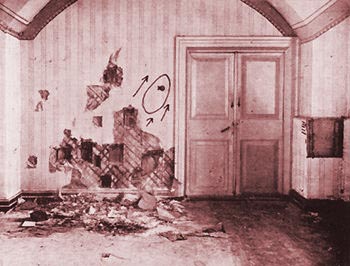 Above: The murder room in the Ipatiev House; this picture was taken after the White investigators had torn up the walls and floor looking for evidence of the murder.
End of the book |
|
Alexandra Feodorovna was the last Romanov Empress of Imperial Russia. This online book - The Life and Tragedy of Alexandra Feororvna was written by Countess Sophie Buxhoeveden, Lady-in-Waiting to the Empress, who served the Empress for many years and followed the Imperial family into exile. |

- Early Surroundings
- Childhood
- A Young Princess
- Engagement
- Marriage
- Her New Home
- Coronation
- Journeys
- Charities and Life
- Queen Victoria
- Foreign Trips
- Birth of Alexis
- Gathering Clouds
- On the Standart
- Rasputin
- Her Family
- Empress at Home
- Last Years of Peace
- Wartime 1914
- War Work
- Without the Emperor
- Visits to Headquarters
- Before the Storm
- Warning Voices
- Rasputin's Murder
- Revolution 1917
- Abdication of the Emperor
- Prisoners
- Five Weary Months
- Tobolsk
- Ekaterinburg 1918


